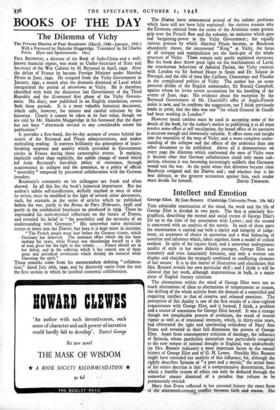BOOKS OF THE DAY
The Dilemma of Vichy
PAUL BAUDOUIN, a director of the Bank of Indo-China and a well- known financial expert, was made an Under-Secretary of State and Secretary of the War Cabinet by M. Reynaud in April, 1940. After the defeat of France he became Foreign Minister under Marshal Petain in June, 1940. He resigned from the Vichy Government in January, 1941, a month after the dramatic dismissal of Laval which inaugurated the period of attentisme at Vichy. He is therefore identified with both the disastrous last Government of the Third Republic and the ill-omened first phase of the Vichy Govern- ment. His diary, now published in an English translation, covers both these periods. It is a most valuable historical document, which calls, however, for minute and careful criticism by the historian. Clearly it cannot be taken at its face value, though we are told by Mr. Malcolm Muggeridge in his foreword that the diary has not been "afterwards revised to any considerable extent for publication."
It provides a first-hand, day-by-day account of events behind the scenes of the Reynaud and Petain administrations, and makes enthralling reading. It conveys brilliantly the atmosphere of heart- breaking suspense and anxiety which prevailed in Government circles in France during those catastrophic events. It explains, implicitly rather than explicitly, the subtle change of mood which led from Reynaud's last-ditch policy of resistance, through acquiescence in collapse and the armistice, to a policy of official " neutrality " tempered by piecemeal collaboration with the German invaders.
Baudouin's comments on his colleagues are frank and often shrewd. In all this lies the book's historical importance. But the author's subtle self-justification, skilfully implied in most of what he writes, must be modified in the light of several other documents, such, for example, as the series of articles which he published before the war, partly in the Revue de Paris (February, 1938) and partly in the confidential brochures he produced in 1939. There he expounded his semi-mystical reflections on the future of France, and revealed his belief in " the possibility and the necessity of an understanding with Germany." His somewhat naive mysticism creeps at times into the Diaries, but here it is kept more in restraint. " The French people must bow before the German victory, which
Germany has deserved. The immense effort which she has been making for years, while France was abandoning herself to a life of ease, gives her the right to this victory. . . . France should see in her defeat, and in the suffering which it has caused, one of those great and periodical revolutions which destroy the material while
liberating the spirit."
These remarks come from his memorandum defining " collabora- tion," dated July 26th, 1940, and he discreetly omits from the text the first section in which he justified economic collaboration. The Diaries leave unanswered several of the subtler problems which have still not been fully explained: the curious reasons why the Germans omitted from the terms of the Armistice some greater grip over the French fleet and the colonies, an omission which gave real bargaining-power to the Vichy Government ; the equally curious process by which Marshal Petain became, as Baudouin abundantly shows, the uncrowned " King " at Vichy, the focus of all intrigue and manipulation yet the linch-pin of the whole structure of Vichy. These remain only partly explained mysteries. But the book does throw great light on the machinations of Laval, the treacherous behaviour of Admiral Darlan, the Vichy contacts with London via Sir Samuel Hoare in Spain and Dr. Salazar in Portugal, and the role of men like Caillaux, Chautemps and Flandin in the complicated politics of Vichy. The author has an acute personal dislike of the English ambassador, Sir Ronald Campbell, against whom he levies severe accusations for his handling of the events of June, 1940. His evidence about the reception by the Reynaud Government of Mr. Churchill's offer of Anglo-French union is new, and he confirms the suggestion, not I think previously made in print, that the idea was one " for which General de Gaulle had been working in London."
However much caution must be used in accepting some of the details of the book, for the author's motive in publishing it at all must involve some effort at self exculpation, the broad effect of its narrative is accurate enough and immensely valuable. It offers more real insight into the mentality of the men of Vichy, and a more complete under- standing of the collapse and the effects of the armistice than any other document so far published. Above all it demonstrates on every page the dilemma which confronted the men of Vichy once it became clear that German collaboration could only mean sub-. jection, whereas it was becoming increasingly unlikely that Germany would win the war. At the point when that dilemma became clear Baudouin resigned and the Diaries end ; and whether that is his best defence, or the greatest accusation against him, each reader


































 Previous page
Previous page